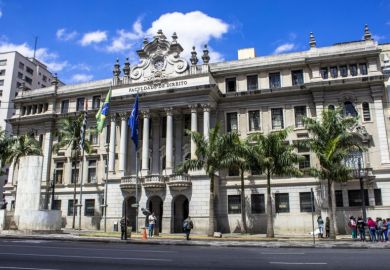The THE Latin America University Rankings will be published at 4pm BST on 7 July
The coronavirus pandemic and its repercussions have highlighted the role of universities and academics in helping to shape public policies for the benefit of society. Complex problems need to be tackled from multiple angles, by using interdisciplinary collaborations and conversations between different domains of knowledge.
In this context, Chile created the “Covid-19 Social Round Table”, led by the interior minister, together with the health and science ministers and other public and government representatives, including the rectors of the Pontifical Catholic University of Chile and the University of Chile. This is a valuable instance of collaboration and coordination that will help to define the national policy to face this pandemic and identify concrete proposals to mitigate its effects. The Pontifical Catholic University has been an active participant, coordinating four of the 10 different tasks.
A result of this work is a document titled “Ethical guidelines in patient care in the case of a pandemic”, which is available in five languages and has been widely distributed among the country’s health services. The Pontifical Catholic University, along with several other universities in the country, has also organised interdisciplinary workshops and seminars with industry, non-governmental organisations and civil associations to help address the challenges that arise.
Another project, which is sponsored by a multinational mining company, is enabling the university to pilot mass detection and clinical and epidemiological monitoring of people infected with Sars-CoV-2. It is working directly with primary care centres in vulnerable, peripheral neighbourhoods in Santiago and two regions in the north of the country. This initiative, scalable at a national level, has been developed in collaboration with the National Centre for Health Information Systems (CENS).
Likewise, strategies are being developed to amplify the capabilities and productivity levels of existing diagnostic teams both in virus detection and in the assessment of the immune response. Along these lines, a simple and low-cost protocol was developed for the extraction of viral RNA for polymerase chain reaction (PCR) tests, and this is available to laboratories across the country; a big step, considering the worldwide shortage of kits for viral detection. We hope that these efforts will also contribute to the University Detection Network of Covid-19, an important association, supported by the Ministry of Science, that brings together 31 university centres from 13 regions of the country.
In a collaborative effort with other universities, disciplines ranging from science and engineering to design, psychology, education and economics have been coordinated to support decision-making and product development. Clear outputs include the development of a national guide providing curricular and social recommendations for school education, as well as reports that provide guidelines to address the economic impacts of the pandemic, including unemployment and mental health aspects. As one of the most difficult effects of the national lockdown is the rise of emotional breakdowns and distress, we are launching a hotline and an app designed to give first aid and advice to the public. Work is also being done on the design and production of face masks, while UV and ozone technologies have been developed to quickly sanitise and potentially reuse different items.
Technological advances already enable the development of cycling devices to automate the process of ventilating a patient with a manual resuscitator; these devices are now undergoing clinical trials with the support of the Society of Intensive Medicine. Furthermore, progress is being made in the development of a possible national vaccine against Covid-19, a long-term project that is progressing steadily and is considering four prototypes, while strategies to develop therapies to fight the virus are also under development.
In the post-pandemic future, universities will not only change their approach to research by strengthening interdisciplinary collaboration, but they will also bring about a profound renewal in the way they teach and integrate distance-learning methodologies, and the value they confer to face-to-face meetings and personal encounters within their community.
The Covid-19 crisis reiterates the public mission of comprehensive universities as institutions that must serve society, seek to detect problems and stimulate collaboration to solve new dilemmas. It is a great responsibility that we are committed to fulfil.
Pedro Bouchon is vice-rector for research at the Pontifical Catholic University of Chile.
The THE virtual Latin America Universities Summit will take place on 7 July. Register here.
POSTSCRIPT:
Print headline: Collaboration is key
Register to continue
Why register?
- Registration is free and only takes a moment
- Once registered, you can read 3 articles a month
- Sign up for our newsletter
Subscribe
Or subscribe for unlimited access to:
- Unlimited access to news, views, insights & reviews
- Digital editions
- Digital access to THE’s university and college rankings analysis
Already registered or a current subscriber?








